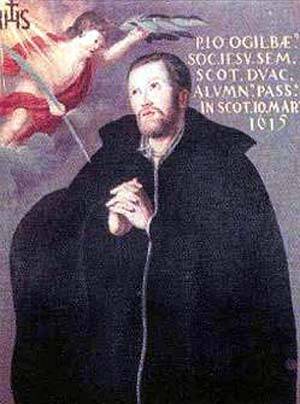A significant celebration occurred on March 10 this year in Glasgow, Scotland. The city lauded St. John Ogilvie, S.J., on the 400th anniversary of his martyrdom. On the previous weekend at the Church of St. Aloysius in Glasgow, staffed by the Jesuits, many gathered for liturgical commemorations of this Scottish Jesuit martyr who was put to death for refusing to abjure his faith and thus became a symbol of religious freedom everywhere.
In our own time, as in John’s, religious freedom and tolerance are center stage, as Christians everywhere reel in dismay at the outrages and persecutions visited on fellow Christians, particularly the horrific murders, the images callously posted online, of hostages and of 21 young Coptic martyrs. Across four centuries and two very different contexts, a common thread runs. Religious affiliation is used as an excuse for inhuman barbarity.
The dystopian distortion of what we have come to call social media cruelly mimics the travesty of religion it broadcasts, much more horrifying now than in John’s time because more people get to see it, but just as unrepresentative of true faith, be that Islamic or Christian.
There are other, less obvious and less shocking persecutions, too, not least in 21st century Britain, where many voices are heard denouncing faith as regressive and ridiculing people of faith as bigots. These are voices that seem unaware of the irony of their own position. In the time of John Ogilvie, similar voices would have been heard voicing similar views in a Glaswegian accent. At stake in these different contexts is religious freedom, and also civil tolerance of one another and of difference itself.
Who, then, was John Ogilvie? What led this proud Highlander to the scaffold on that gray Glasgow afternoon 400 years ago?
His father had conformed to the recently established state religion by the time John Ogilvie was born in northeastern Scotland in 1579. So John grew up a Calvinist during a tormented period of religious and political upheaval. Those turbulent years were marked by several fluctuations, now toward Episcopalianism, now toward Presbyterianism, while the skilled political philosopher King James VI (of Scotland, 1st of England—the crowns would be united in 1603) played one faction off against another.
James’s kingdom had dabbled with state-appointed bishops. But those policies infuriated the Calvinist Presbyterian camp—which had no tolerance for anything that suggested episcopal authority rather than sola scriptura, sola fide—so Roman Catholics were beleaguered from both sides. John Ogilvie, repudiating the claim that the monarch could dictate and delimit anyone’s religious beliefs, was killed for that refusal.
John, absent from his native land for 22 years of travels around Europe, during which he became a Catholic and entered the Jesuits, was arrested after only 11 months of ministry. His arraignment, torture and trial were vicious.
He would suffer terrible tortures, including being forcibly kept awake for eight days and nine nights and a torture called “the boots,” in which iron shackles forced the very bone marrow from his legs, to make him reveal the identities of other Catholics. Ogilvie did not relent and was convicted of high treason for refusing to accept the king’s religious jurisdiction. On March 10, 1615, at age 36, John Ogilvie was paraded through the streets of Glasgow and hanged at Glasgow Cross.
We honor John Ogilvie this month, in this 400th year since his execution, as a martyr for religious freedom. Our 21 young Coptic martyrs, murdered by terrorists, did not have the choice to die for practicing their faith that John was offered but that he could never accept, such was his integrity. Both he and they died with a prayer on their lips, powerful symbols of our need to protect and struggle for religious freedoms because, once again, that very freedom is becoming a pressing concern in our day.
John’s was a local struggle in a small European state; the martyrdoms of our 21 young Coptic brothers were displayed on the global screen. The pressure on religious tolerance is, arguably, an aspect of that “globalization of indifference” that the pope has repeatedly emphasized; we can define that as rooted in individualism and selfishness, intolerance and bigotry. Those celebrations in Glasgow on March 10 will have been a success if they stimulate even a few of us to think about our own intolerance and what counts as true or false faith today.








